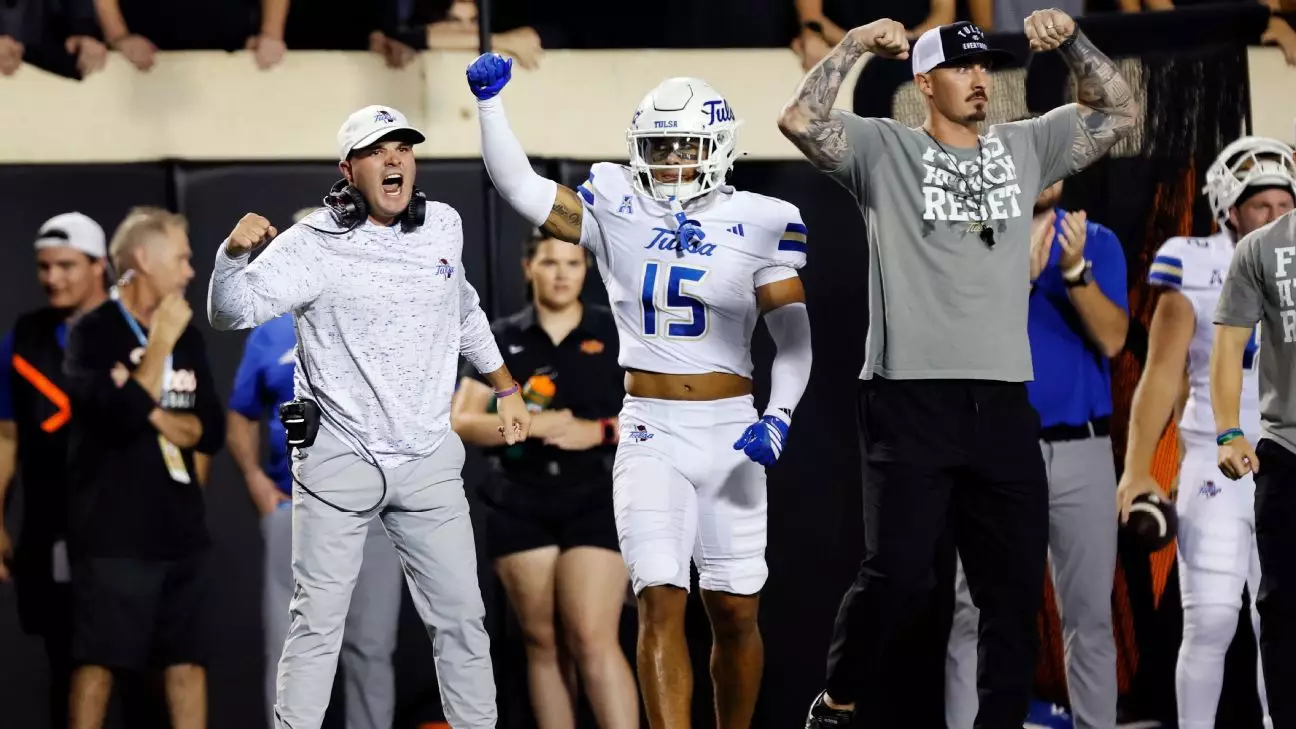In the world of college football, narratives of decline often overshadow stories of resilience and rebuilding. The recent victory of Tulsa over Oklahoma State in Stillwater is more than just a scoreboard anomaly; it’s a testament to the power of strategic innovation and the indomitable spirit that can turn perceptions on their head. At a time when the Golden Hurricane’s season seemed teetering, this win stands out as a beacon of hope and a stark reminder that football remains an unpredictable and emotionally charged sport that refuses to be pigeonholed by recent history.
This game reveals much about the often-overlooked importance of tactical adjustments and player development. Redshirt freshman Baylor Hayes emerged as a surprising yet effective leader, throwing for 219 yards and a decisive touchdown. His calm decision-making—completing 23 of 36 passes without a single interception—defied expectations of inexperience. Simultaneously, Seth Morgan’s reliable leg stepped into the spotlight with four field goals, slicing through Oklahoma State’s defense with precision kicks at critical junctures. These individual performances, however, are merely a surface narrative; underlying them is a broader commentary about Tulsa’s strategic evolution and its belief that talent, when nurtured correctly, can challenge even the most established programs.
The significance of this win lies not only in the scoreboard but also in the symbolic breaking of a nearly 70-year-old losing streak in Stillwater. Ending a 23-game losing skid and snagging a victory on enemy turf signifies more than just a triumph—it’s a challenge to the complacency often associated with long-standing losing teams. It underscores the importance of fostering a culture of resilience and innovation, even when the odds seem insurmountable. For Tulsa’s coaching staff, this isn’t just about celebrating a win; it’s about demonstrating that their program can learn, adapt, and conquer adversity.
Shifting the Narrative: A Reflection on Change and Institutional Growth
Oklahoma State’s struggles highlight a broader issue facing many programs—once proud institutions that are now failing to meet expectations. Their recent streaks of defeat, especially when coming off a significant loss such as the 69-3 defeat to Oregon, suggest deeper systemic vulnerabilities. Coach Mike Gundy’s acknowledgment of Tulsa’s “outcoached” team hints at a loss not just on the field but in strategic execution and in-game adaptability. The Cowboys’ inability to respond effectively after halftime reflects a program in need of introspection and a willingness to evolve beyond traditional play-calling.
This game underscores a fundamental truth in college sports: no team is invincible, and complacency can be a coach’s worst enemy. Tulsa’s victory, against a team that was reeling and coming off a humiliating defeat, is a stark reminder that motivation and determination can often surpass raw talent. It challenges the narrative that stronger programs are immune to tactical shortcomings or lapses in focus. The Golden Hurricane’s comeback attempt in the second half, led by third-year freshman Zane Flores, exemplifies how leadership and perseverance can ignite hope even when the odds are stacked against you.
The game also prompts a reevaluation of what it means to rebuild. Tulsa’s victory was not just based on a single game plan but reflects a broader ideological shift—investing in young talent, emphasizing versatile skill sets, and instilling resilience in players. It highlights the importance of mentoring a new generation of athletes who are capable of seizing opportunities and rewriting their team’s story. This is an essential lesson for an industry that often clings to tradition at the expense of innovation.
The Deeper Message: Courage in the Face of Adversity
More than just a football game, Tulsa’s win stands as a metaphor for progress in a sport—and a society—that values perseverance over legacy. It sends a clear message that setbacks do not define a program’s future; it’s the response to those setbacks that does. For Tulsa, this victory is a bold statement: we are back, not merely as a team seeking fleeting success but as an institution committed to growth, resilience, and challenging the status quo.
In the broader context of college athletics, this game demonstrates that success doesn’t necessarily come from the dollars spent or the historical prestige but from strategic vision and a belief in potential. Tulsa’s coaching staff deserves recognition for fostering an environment where young players can step up, innovate, and defy expectations. Meanwhile, Oklahoma State’s struggle serves as a cautionary tale about the perils of stagnation and overconfidence, emphasizing that continuous adaptation is essential for long-term viability.
The emotional core of this upset reminds us that sports are a reflection of life’s unpredictability. It encourages a centrist liberal perspective—a belief in reform, resilience, and the importance of nurturing talent and effort, regardless of stereotypes or recent failures. Victory, after all, is often about the courage to persevere and the willingness to challenge comfort zones in pursuit of meaningful progress.


Leave a Reply